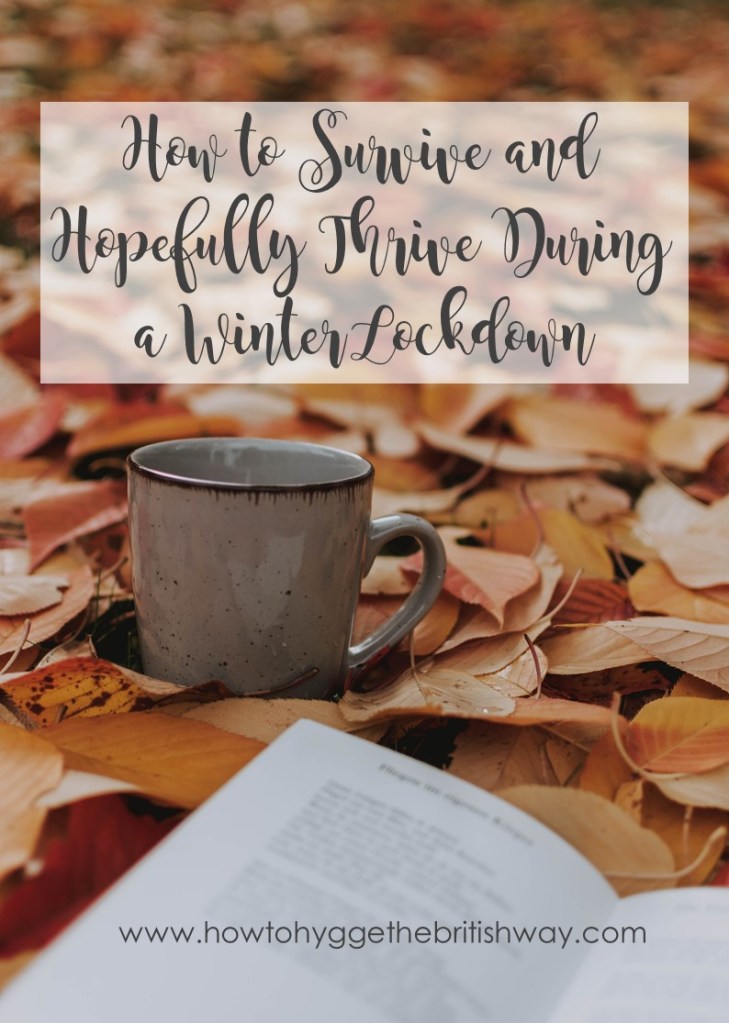The UK definitely seems to be heading towards a second country-wide lockdown. Let’s face it, a lot of people feel like they never got out of the first one, properly. With the exception that children went back to school and University (and, goodness knows, that is stressful to experience as a mother) there were a lot of workers who never got their rhythm of working back and many who will never return to pre-covid jobs.
I will not say anything political, it’s not my job to say whether a lockdown is necessary or proportionate: but I am here to say that it is happening, or will happen, and that people need to plan ahead, to prepare a survival system to help them physically, mentally and emotionally.
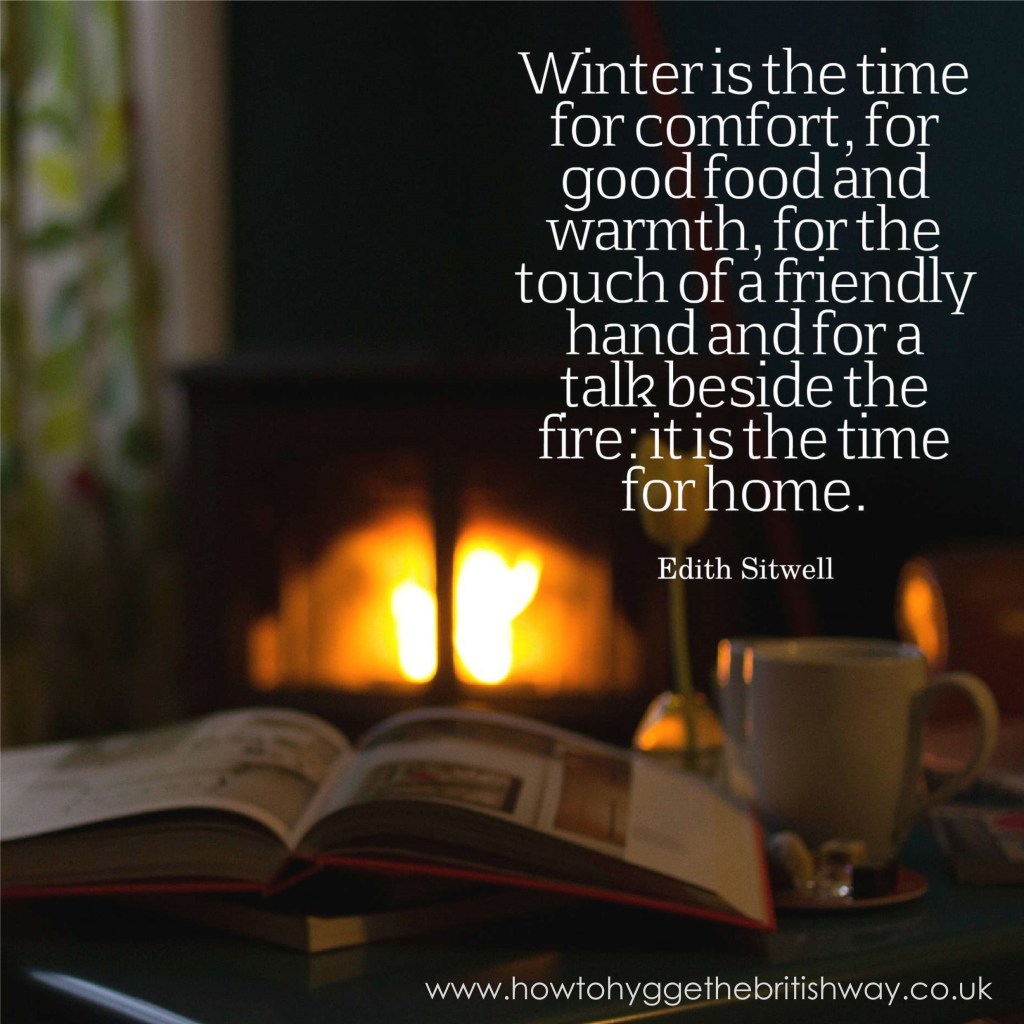
Lockdown in Winter will have a whole raft of issues that the global shutdown in Spring’s mild weather didn’t. There’s the fact that we know infection rates of flu and cold shoot up generally in winter, so infection rates for Covid look likely to rise as well. There’s the lack of outside access due to shortening days and falling temperature and there’s the increased financial pressure that we must all be feeling when friends and family are on furlough or being laid off. 2020 looks set to end us all off in a difficult position. What, then, can we do to help ourselves and our families to get through the next few weeks? Using the basics of hygge can help: gratitude, living in the moment, enjoying simple pleasures and getting used to leaving the worries of life (even the biggest ones of all) to one side as you restore your own balance and that of your closest family or friends. Here, then, are a few ideas to help you.
Ways to survive Lockdown using hygge:
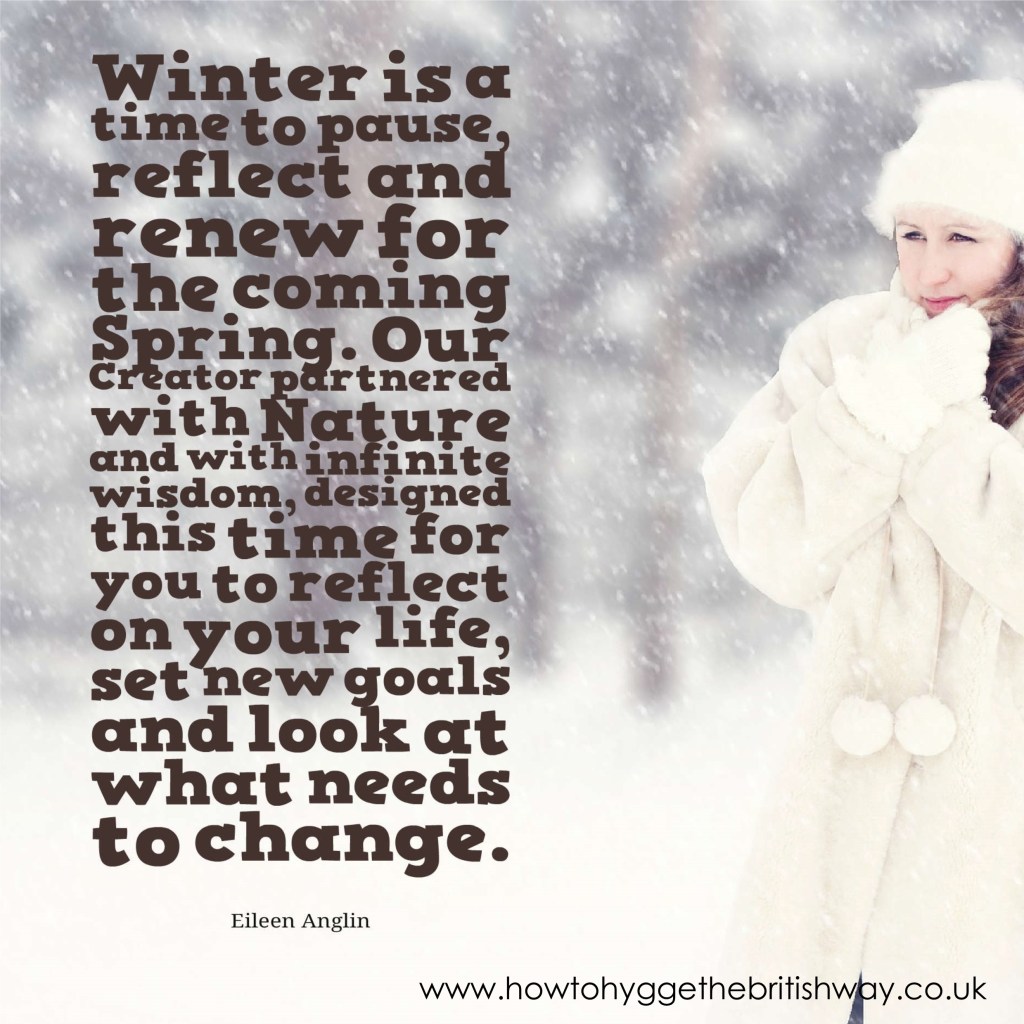
Set up rituals: Hygge is about finding peace amid the noise and haste: that’s easier if you know there are times when you can find peace. Setting up rituals sounds fancy, but basically means selecting a few regular events each day and giving them an intention and a significance in your life.
It’s like making your morning coffee into a calmer, cooler experience by adding a lit candle (the light gives you something to focus on), keeping the TV off in the background, using a special cup, especially one with a positive quote or affirmation on, and granting yourself the ten minutes to gather your thoughts, appreciate today’s mood and move forward from a place of peace rather than exhaustion. Good points in the day to attach a ritual to are morning time, a mid-morning break at work, lunchtime, the half hour after school, once the kitchen is tidy after cooking and bedtime.

Find ways to get outside: As the nights draw in and the evenings lengthen, it can be easier not to venture outside. And, if you’re working from home or the office finding time to spend in daylight hours can seem difficult. Yet the positive benefits of outside exercise are well known and even just time spent in the fresh air can be a great mood boost, with increased vitamin D being put forward as a possible benefit in fighting Covid.
Grabbing ten or twenty minutes from each day to take a walk in daylight hours is, therefore, not an indulgence but a medical necessity. Take comfortable shoes and walk for part of your lunch hour. Take sandwiches and a good coat and slip out to a park bench (if they’re still open), or pick up a takeout coffee and carry it to a bridge anywhere. There’s something about standing on a bridge that gives you a new perspective on life.
And if daylight hours aren’t available, never mind. Walk anyway. Mr Hygge Jem and I walk after our evening meal as many nights as we can. We get the time together, get the exercise and the only benefit we truly miss out on is the extra Vitamin D… which I add through supplements like this mouth spray.
Keep to a regular pattern whether you’re working or not: The temptation when you’re not working, or at least not getting up to go into work, is to let your schedule slide. I know only too well that my natural daily preference is to go to bed after midnight and lie in until 10am or later. That’s not good if you’re aiming to catch the Sun’s rays. I keep to working hours most days of the week: I wake at 6.30, get up at 7 and get ready for work at 8. Bedtime happens at 11.30 each night, even on a Saturday. I can’t mess my daily pattern up too much now, otherwise (rather like drinking the bottle of wine in one go) I pay the price the next day.
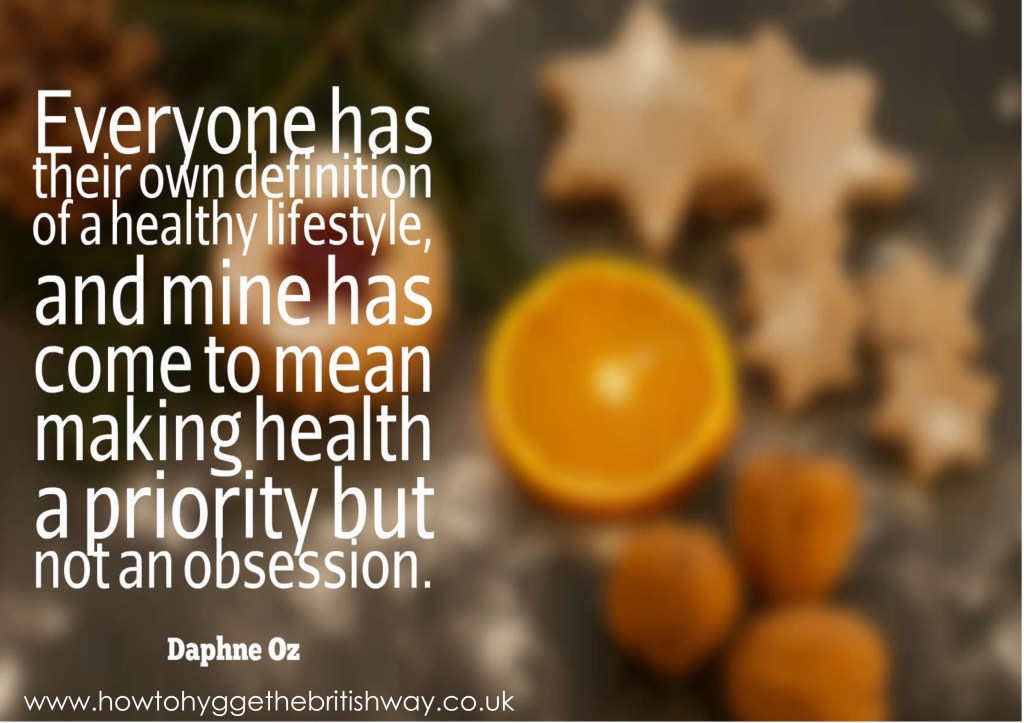
Make sure the Pillars of Health are in place: The pillars of good health are food, sleep, stress and exercise. If you get these in place, and in balance, then you reap the benefits in a healthier body and a healthier mind.
Take a News diet: Try to limit or eliminate programmes that add to your stress or distress. Change your radio channel from a talk station to a music station, make Hallmark Movies your default TV channel and, as far as possible, ignore the news except for one programme a day when you catch up on the details you need. It can be hard to escape news on social media so perhaps cut down your use of that as well. If I’m having a news detox session, my favourite tactic is to uninstall all social media apps from my phone except for Facebook, when I remove the icon from my home pages and replace it with a direct link to my favourite group, The Hygge Nook. Because it’s guaranteed no politics, no arguments and filled with people sharing their quiet moments of hygge, it makes for comfortable scrolling.
And ways to thrive?
It is also possible that you have all these set up in your life already. It’s possible that you actually found the quiet life during Lockdown suited you and that, post-Lockdown you kept up many of the simple pleasures that you enjoyed and that now a second Lockdown holds no fears for you, except in the concerns you have for other people and the world. That’s fantastic: certainly there is never one fixed way to react to any event in your life and actually finding a positive in what many people saw as a negative situation isn’t a bad thing (as long as you’re not the one looking at the charging tiger and going “What a cute pussy cat! Can I stroke it?”
If you’ve found the way to accept Lockdown as just another stage in life, all be it one you hope is unique rather than a repetitive experience, then you should be seeking to thrive in this moment, not just survive. Now’s the time to move your skills forward, and to look at making sure you benefit. Gabrielle Treanor has this mapped out on her Pandemic Response circles. (Gabrielle’s courses are excellent, by the way, and her blog makes interesting reading, especially this post on How to Deal With Feelings of Overwhelm around Coronavirus)
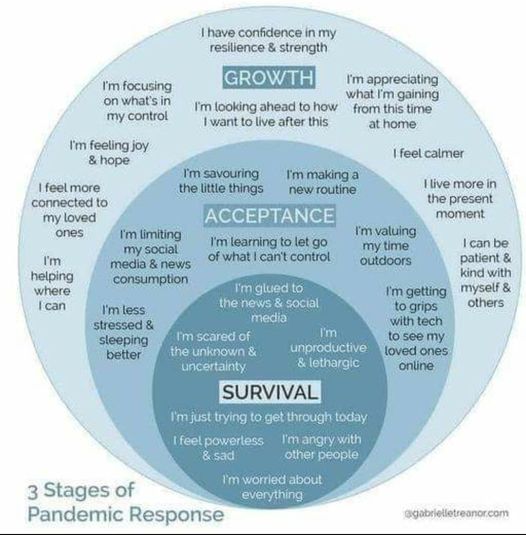
Take time to Express Gratitude; Every little thing in our life is a gift, from the Universe, a greater deity or from our own mind if we think it so. Cultivate your inner Pollyanna: seek out the good in circumstances that could so easily lack all positivity. Collect them together, in your mind or on paper, and be thankful for the life we have.
During Lockdown I found I was grateful for time with my adult children. None of us had anywhere to be, so we spent evenings together watching TV, chatting about life, walking around the block. It was an unexpected break from business that means I waved my daughter off after a summer of love, with a clear conscience and a happy feeling that she was ready to grow up and adult.
Perform acts of Kindness and service for others: If you have what you need and are secure and safe, then pass that blessing on. Do small acts of kindness for a stranger, like paying for an extra coffee for the person behind you in the queue, offering to collect shopping for an elderly neighbour or, if you don’t want to do the actions face to face, give generously to charity. Many actions that were once thought of as just good manners or chivalrous are acts of care. Hold doors open, move from bus or train seats or remember always to be polite in dealings with other people. Having enough generosity of spirit to be kind to others is a great gift.

Use your time creatively: Winter is always a good time for hibernation, for developing skills and finding a way to grow mentally, physically and emotionally. If most outside entertainments are unavailable, then look at what you can do to develop yourself as a person: is there a skill you’ve always wanted to learn, but lacked the time to? Have you always wanted to learn a language? Is there a book that you know you’d enjoy but never had the time to read? Set yourself a challenge, set aside the time and go for it. Creativity is always part of my winter retreat now: Coronavirus Lockdown just means I start it earlier. And learning needn’t be a physical thing: ask yourself “How do I want to grow inside and what do I need to do to make that happen?”
Find your tribe and support them: Do you have a physical tribe? Lucky you, having a group of friends or family that stand by you whatever and that you can stand by whatever happens is valuable. It’s not to be sniffed at. Keep them close, create links physically or virtually by agreeing to meet once a week in person, if that’s possible, for a walk or a coffee outside or by having a Whatsapp group chat or zoom calls, just the chance to meet up and ask whether everyone is doing okay, do they need anything, can you help.
Members of families that live in the same house have their tribe pretty much set out, and finding ways to bond or to ask the deep questions that need to be asked should be (but often isn’t) easier. Set time aside occasionally, have a policy of No Question Is Stupid, or find the space side by side to do something inocuous that encourages talk. Watching a fire, clearing leaves, going for a drive or playing card games can all act as a cover for the catch up on mental and physical wellbeing that you need.
And never forget that you may not know how valuable the small act of kindness you do is. That inspirational quote posted on social media, a card sent just to say “Thinking of you” or a phone call over a shared viewing of Great British Bake Off. Small actions with sometimes great results.
Indulge in Anticipation of the Future: Yes, mindfulness is best and yes, we like to live in the moment… but having a vision of how you want to live your life after the present circumstances pass or we find we have to live with a new virus that circles around the population year after year can be a worthwhile goal to bear in mind. Have you found out things about yourself in solitude that you weren’t free to discover before? If you count yourself as having thrived during lockdown because the very domestic-focused nature of life suited you, and you find yourself wanting to keep that going forward, then what can you do to twitch your life and make that happen? Have you missed your social life? How do you intend introducing that back into your daily rhythm. Plan how you see your daily life passing, because our lives are lived in the minutes of our day.
But plan the big things as well. Has Lockdown revealed any deeper needs or desires that you want to fulfil? Are there any big goals that you want to start aiming at? Set your intention and start the baby steps towards these, if you can, or at the very least start research. Are you ready to change career? I know at least one teacher who is moving on from the classroom to childcare (when she gives me permission, I’ll show you her classroom in her converted garage: it is gorgeous!) and another friend who knows the time is near for her to retire. They’re both planning for life post-virus.
And finally keep positive: at times of stress, darkness and any moments when life seems hard, turn to Julian of Norwich who, despite the name, was a wise woman of the Middle Ages. I know many people find solace and support from her words, so here they are again:
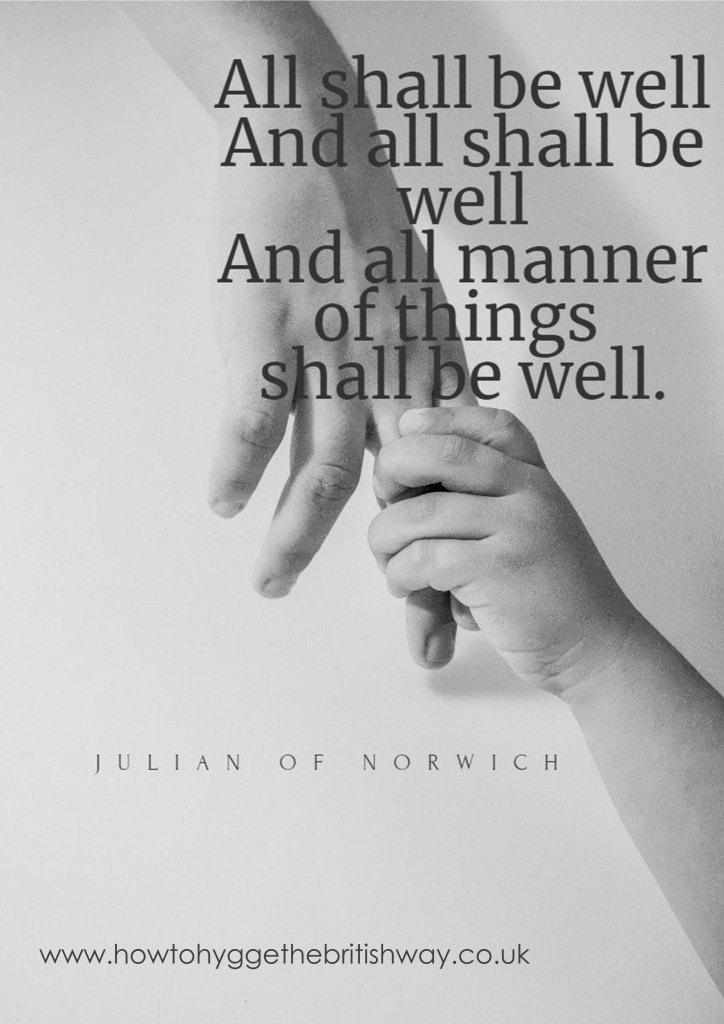
If you’d like to support me….
I don’t monetise my blog. I don’t run adverts, take sponsorship for writing posts or use affiliate links. I want everything I do on this blog and in my hygge life outside to be truthful. If I promote a book it’s because I’ve read it and like it, if I point out an item it’s because it’s impressed me on its own merits and not because the publicist has talked me into it. It does mean I don’t run giveaways and I’m not chasing followers, but the drawback is that I need to find a way to support myself.
That’s why I write books. My thoughts are that if I ask you to buy a book not only does it support me, and let me keep writing as an independent writer, but you get something back for your bucks. I’ve written several books, some on Hygge, some on Christmas. If you like what you read here, or in the Hygge Nook, and you’d like to support a struggling writer, would you please consider buying a book? E-books give you the best value, since for 2 or 3 pounds you get the whole content of the book without paying the extra for paper production, but I’d be a pretty poor writer if I didn’t appreciate the beauty of a real book in the hand. If you buy even just one book, it all adds up in the end to support me, and I’d be so grateful.
My latest book, Celebrating a Contagious Christmas, is available on Amazon now as an ebook and, by popular demand, a paperback. It’s about the adjustments we’ll have to make to our usual Christmas celebrations if we’re in Lockdown come December, how illness or employment may make a difference and how we have to spread hope, not germs, in an attempt to keep the world on an even keel.

Cosy Happy Hygge is available as an ebook or a paperback on Amazon now. It’s about using rhythm and ritual to make your life a gentler, kinder place. Writing it has been an important part of my mental health recovery.
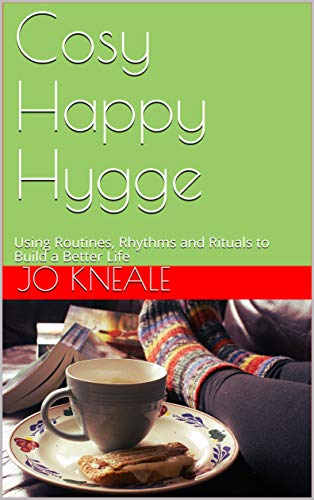
My first three books are hygge related, 50 Ways to Hygge the British Way was my first book, and is available in Paperback and Kindle version. It’s a simple look at ways to feel more hyggely in life and at home even though we’re not Danish and don’t have it in our DNA. Although it was inspired by the blog, it’s completely original work and not collected blogposts. It will probably be updated and an improved second edition coming in Spring 2021.
How to Hygge Your Summer, in Paperback and Kindle form, has lots of good ideas for the summer months. I strongly believe that hygge is so much more than throws and warm drinks.
Happier is my fourth book. It’s about how I boost my own happiness levels. It’s full of hints, tips and ideas for you to use and adapt to suit your own situation. It is available in ebook and paperback version from Amazon.co.uk and Amazon.com.
I have three Christmas books,
Have Yourself a Happy Hygge Christmas was released in September 2017 and is available again in paperback and ebook version. It looks at keeping the Christmas season warm and cosy, with ideas for activities and routines to keep Christmas happy.
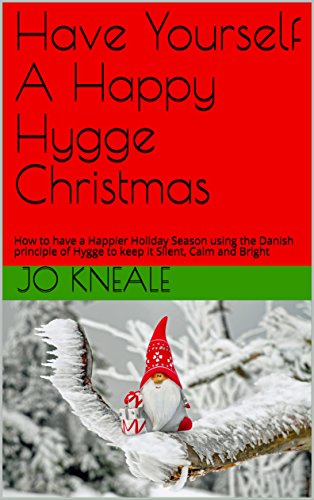
A (Hygge) Christmas Carol is my look at Dickens’ immortal classic and the many lessons we still learn from it today. It contains the full text of the book as well as hyggely thoughts on the story.
Enjoying a Self Care Christmas is only available in e-book version. It’s about keeping Christmas simple enough and healthy enough to keep you sane in the process. I’m hoping to do a series of Self Care through the year books.
If you already have my books, or just want to support me as an independent writer, you can always just send me the price of a cup of coffee as a friend, to paypal.me/HyggeJem . I tend to use a lot (all) of my spare cash on books that I review for the website, so every penny donated goes towards building my happy hygge life.
If you buy any of the books or some of the items through the links on this page, I get a couple of extra pence per copy, as an Amazon Affiliate, in Amazon vouchers which go towards buying more books to review for the blog. I’d really love it if you’d support me monetarily, but I quite understand that cash is tight for many people, and I just love having your support via reading and commenting as well.
Truthfully, I’ll probably never make a living as a writer, but I do make a little extra income that gets ploughed back into books and magazines. One obsession feeds the other.
